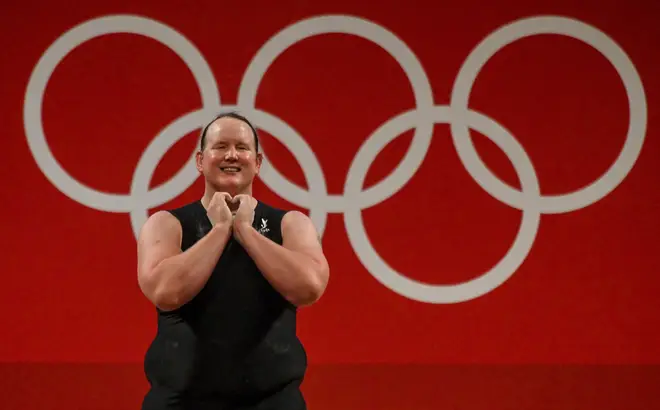
Richard Spurr 1am - 4am
4 August 2021, 19:22 | Updated: 4 August 2021, 19:26

Laurel Hubbard, the first openly transgender athlete to compete at the Olympics, has hinted at her retirement after failing to qualify in Tokyo.
The New Zealander, whose inclusion in the women's 87+ kilogram event caused some controversy, made history in her appearance at the Games on Monday.
The 43-year-old was considered a genuine medal contender but was eliminated following the snatch section of the competition, with Team GB's Emily Campbell striding onto the Olympic stage and delivering two lifts that landed her a silver medal.

Olympic adviser says Laurel Hubbard testosterone levels 'reasonable'
Following her performance at the Games, Hubbard told a press conference it might be time for her to "hang up her boots".
"Age has caught up with me," she said.
"In fact, if we are being honest, it probably caught up with me some time ago.
"My involvement in sport has probably, due if nothing else to heroic efforts of inflammatories, it's probably time for me to start thinking about hanging up the boots and concentrating on other things in my life."
Despite going home from Tokyo empty handed, Hubbard has certainly had an impact on the sport and started a conversation.
She began transitioning in 2012 and met the IOC's rules for transgender athletes, which allow them to compete in the category if they maintain a sufficiently low testosterone level for at least 12 months prior to competition.

James O'Brien responds to controversy around Olympian Laurel Hubbard.
Olympic adviser Dr Joanna Harper told LBC that the weightlifter's testosterone levels allow "meaningful competition" with cisgender female athletes, amid the controversy.
Tom Swarbrick asked Dr Harper: "Have the Olympic Committee got this wrong?"
"I think that testosterone levels probably should be lower than ten nanomoles per litre," replied Dr Harper, referring to the total testosterone limit that female transgender athletes are allowed to have in the Olympics.
"I was on a committee in 2017 that recommended five.
"It's absolutely true that lowering testosterone won't eliminate all the advantages accrued during male-type puberty, but it does mitigate them to the point where I believe that in most sports we can have meaningful competition between transgender and cisgender women."
Speaking after her performance at the Games, Hubbard thanked the Olympic organisers for her inclusion and for their support.
"I know that from a sporting perspective I haven't really hit the standards that I put upon myself and perhaps the standards that my country has expected of me," she said.
"But one of the things for which I am profoundly grateful is that the supporters in New Zealand have given me so much and have been beyond astonishing.
"I'd like to thank the New Zealand Olympic Committee, they have supported me through what have been quite difficult times."